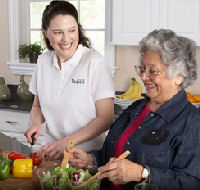 “10 Holiday Warning Signs” Your Senior Is In Trouble
“10 Holiday Warning Signs” Your Senior Is In Trouble
By Stacey Hilton
November 16, 2012 (San Diego) -- The holiday season may be one of the few times local families get together and realize their elderly loved ones are in deep trouble and need immediate help. Adult children who don’t live nearby often come home to holiday heartbreak with deteriorating relatives they aren’t prepared to handle. So this holiday, the family might gather around the kitchen table – not only for turkey and treats, but also for a talk—a big talk—that maps out a plan to care for aging relatives.
That’s why Senior Helpers, one of the largest in-home senior care companies with caregivers in our city, advises families with the “10 Holiday Warning Signs Seniors Need Help.”
“This Thanksgiving and Christmas, thousands of adult children will be shocked to come home to elderly relatives who are lethargic and forgetful. They’ll see a messy house, bills piling up, the joy of the season clouded with the realization that elderly relatives are struggling and can’t make it alone,” says Peter Ross, CEO and co-founder of Senior Helpers, one of the largest in-home senior care companies with offices in our city with highly trained caregivers specializing in dementia and Alzheimer’s care. “This is the time to map out a care plan for aging relatives and that plan should include hiring caregivers who can help ease the burden for families.”
Holiday Heartbreak
Two years ago at Christmas, Truly Bracken and her brother came home to Charlotte, North Carolina and realized their 83-year-old mother Margaret shouldn’t be staying home alone anymore. During the holiday visit, on a normal stroll outside, Margaret lost her balance and fell.
“Mother didn’t trip on anything. She just lost her balance and took a bad fall,” says Truly. “Luckily she didn’t break any bones, but seeing her fall prompted a family discussion about mother’s care.”
Truly and her brother both live far away, so they brought in a Senior Helpers caregiver to stay with their mom all day, 7 days a week.
“It’s a huge relief knowing the caregivers are with Mother because they’re so knowledgeable and caring,” says Truly. “Mother feels like they’re friends.”
Senior Helpers’ “10 Holiday Warning Signs Senior Loved Ones Need Help”*
- Poor eating habits resulting in weight loss, no appetite, or missed meals.
- Neglected hygiene - wearing dirty clothes, body odor, neglected nails and teeth.
- Neglected home - it’s not as clean or sanitary as you remember growing up.
- Inappropriate behavior - acting loud, quiet, paranoid, or making phone calls at all hours.
- Changed relationship patterns that friends or neighbors have noticed.
- Burns or injuries resulting from weakness, forgetfulness, or misuse of alcohol or medications.
- Decreased participation in activities such as attending the senior center, book club, or church.
- Scorched pots and pans showing forgetfulness for dinner cooking on the stove.
- Unopened mail, newspaper piles, missed appointments.
- Mishandled finances such as losing money, paying bills twice, or hiding money.
“When family members get together, it’s great to finally recognize and see firsthand that their elderly loved ones may have a problem,” says Ross. “But conflict often surfaces when family members have to agree on a solution, especially when the senior has dementia or Alzheimer’s and family members don’t know how to handle it. That’s why Senior Helpers offers a Holiday Family Meeting Guide to discuss the major sticking points. As part of that plan, we strongly encourage the family to hire a trained caregiver to get elderly loved ones the proper care. Our 10 Holiday Warning Signs and Holiday Family Meeting Guide initiatives are both part of our dementia and Alzheimer’s program called the Senior Gems®.”
Senior Helpers’ “Holiday Family Meeting Guide”:
- The person leading the meeting can be the elderly relative who anticipates needing care in the future. If that person already needs care, an adult child, friend, or relative can lead.
- Encourage discussion and get input from everyone. Make sure everyone makes their feelings known.
- Discuss money. Who will pay? How? If the money is coming from the elderly relative’s estate, who will be the executor?
- At the end of the meeting, everyone present must commit to support the plan.
- Write it down. Good intentions are often forgotten over time and family members must have their responsibilities right in front of them.
*Source: The Council on Aging
To learn more about how to care for your senior loved one with dementia or Alzheimer’s through the Senior Gems® program, please visit our website at www.seniorhelpers.com. There you can also request a complimentary Senior Gems® DVD.







Recent comments